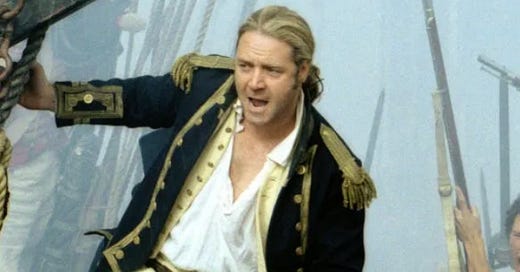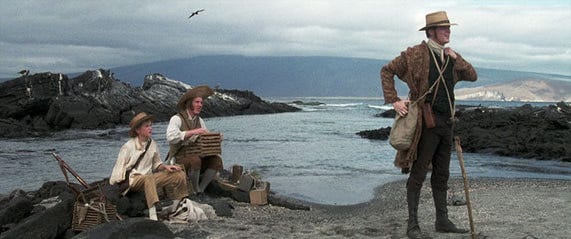Master and Commander
December 1, 2003
The American Conservative
FILM
Austen & Clancy
By Steve Sailer
Master and Commander: The Far Side of the World tries to lure literate middle-aged men back to the movie theatre by delivering an action blockbuster of rare intelligence and authenticity. Esteemed Australian director Peter Weir spent a whopping $150 million crafting a splendid film out of the late Patrick O’Brian’s cult novels about the British Navy during the Napoleonic Wars.
Three years after the 1966 death of C.S. Forester, author of the rollicking Horatio Hornblower sea tales, O’Brian published Master and Commander, raising the Age of Nelson genre to a new plane of literary quality and technical accuracy. O’Brian reads as if Jane Austen had penned a precursor to Tom Clancy’s The Hunt for Red October based on her seagoing brothers’ adventures in those pre-industrial technological marvels, the Royal Navy’s frigates.
O’Brian’s series of twenty books details the friendship of the hearty captain Jack Aubrey and the rationalist ship’s surgeon Stephen Maturin. Their odd couple camaraderie resembles that of the 18th Century explorer Capt. James Cook and his naturalist Joseph Banks (the subject of a biography by O’Brian), or their futuristic counterparts in Capt. James Kirk and Mr. Spock / Dr. McCoy. Indeed, O’Brian’s novels appeal primarily to men who are little too old for science fiction and fantasy, whose interests have matured from the future to the past, from the imaginary to the intensely real.
While O’Brian’s admirers, such as George Will and David Mamet, are extremely articulate, they are a small elite compared to the legions who read The Lord of the Rings or Harry Potter. Indeed, I gave up halfway through the first novel, finding myself at sea amidst all the jargon about the “mizzen topgallant staysail” and the like.
Orrin Judd explains: “The reason O’Brian’s books so effectively transport us to another time and place is because they seem to have been written there and then. His mission is not to explain that epoch to us, but to present it for our consideration, nearly unadorned by modern sensibilities… The books have the quality, not of historical novels at all, but instead of classic tales newly rediscovered.
Weir preserved much of that uncompromising archaism in his film’s sometimes unfathomable dialogue. Fortunately, the director of Gallipoli and Witness is expert at showing while telling, so I never lost the thread for long. Still, Master and Commander requires more mental effort than is common in films with a Pearl Harbor-sized budget.
The filmmakers lifted the basic plot from the tenth novel, The Far Side of the World, but integrated a greatest hits collection of clever gambits from other books. In 1805, with nothing but the Royal Navy standing between Napoleon and the conquest of England, Aubrey is ordered to pursue an advanced 44-gun French privateer in his elderly 28-gun frigate, even though his ship appears too weak to fight and too slow to run away.
Undaunted, Aubrey pursues his quarry from the coast of Brazil all the way around Cape Horn to the Pacific’s exotic Galapagos Islands, uninhabited volcanic extrusions that look like God’s own ashtray. The film conveys how exciting was the freedom enjoyed by sea captains, in an age when land travel was no easier than in Roman times, to be able to take off on one’s own discretion for the far side of the world.
It would be heartening if this movie proved hugely profitable, but I’m not counting on it. Its demographic appeal seems quite narrow. Some ladies may want to see Russell Crowe (Gladiator) as Captain Aubrey. He is indeed perfectly cast -- no serious actor is a better action star and no action star is a better serious actor.
Still, Master and Commander takes place almost wholly at sea and no women have speaking roles. Crowe is putting on weight as he ages, making him even more of a man’s man star. Here, he plays the kind of leader that men wish to serve under -- fair and amiable in peace, but as cunning as Odysseus in battle.
The movie relegates Maturin, portrayed by Paul Bettany (best known as Crowe’s imaginary friend in A Beautiful Mind), to second bananahood, although one recurring twist is evocative. Maturin, a dedicated naturalist, seems on the verge of conceiving the Theory of Natural Selection thirty years before Darwin’s enlightening visit to the Galapagos … if only he can get enough time ashore to taxonomize the storied wildlife. But exasperating duty repeatedly drags him off to military, rather than scientific, glory.
After World War I, Churchill wrote, “War, which used to be cruel and magnificent, has now become cruel and squalid.” Master and Commander depicts war at its most fascinating and least repellent, as a few hundred experts duel in gorgeous machines, with innocent civilians safely away over the blue horizon.■






On 12/31/1999, Y2K Eve, as so many people huddled in terror of The Computers breaking at the stroke of midnight, Russell Crowe was just about the only celebrity to welcome in the new millennium in a hearty, time-honored fashion, getting himself arrested three separate times for Drunk & Disorderly conduct.
So, it not surprising that he didn't preserve his leading man looks for long. But he was really something around the turn of the century: L.A. Confidential, The Insider, Gladiator, A Beautiful Mind, Master and Commander, and Cinderella Man.
Weirs use of Fantasy on a Theme when they cut away the overboard sailor was one of the most devastating and majestic scenes in cinema